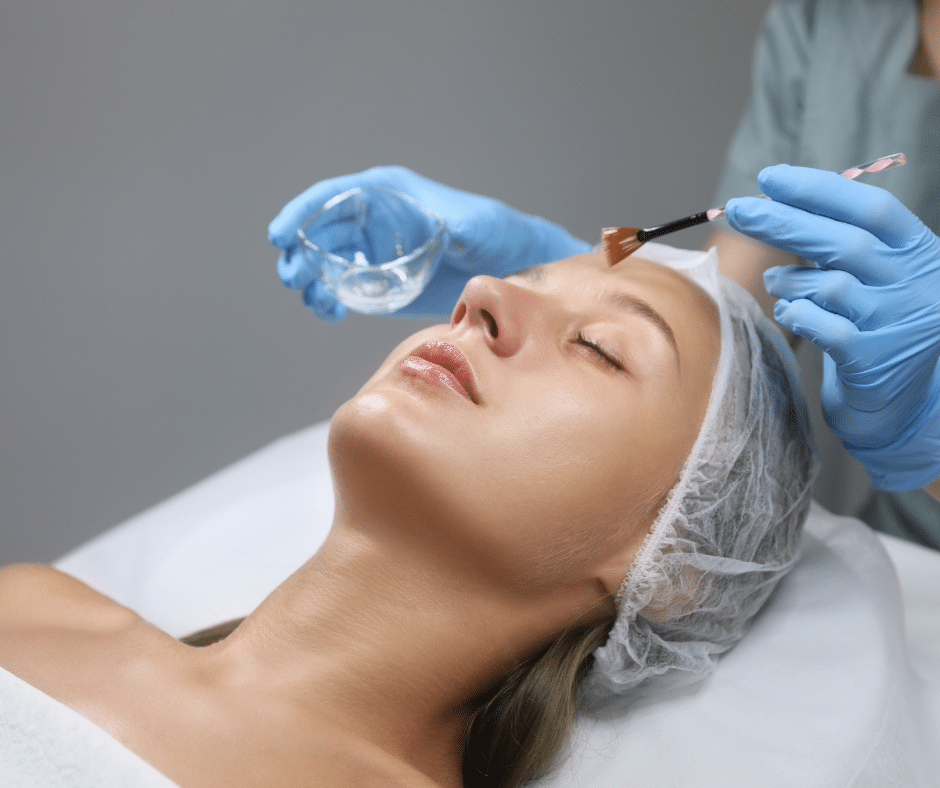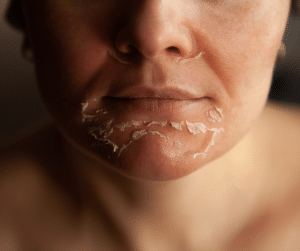The Transformative Power of Chemical Peels
If you are looking to improve the look of your skin, by reducing wrinkles, addressing acne or lightening dark spots, chemical peels may be the right choice for you. There are a few things that a cosmetic doctor considers before choosing the right type and course of treatment for you, but with the help of our cosmetic doctor specialist, we have pulled some great information about chemical peels to help you understand it better.
What Are Chemical Peels?

Also known as resurfacing, the chemical peel is a non-surgical cosmetic procedure where a chemical solution is applied to the skin, usually hands, face and neck. The chemical peels work by removing the problematic top layers of the skin that may be the cause of your concerns, causing them to peel off. With the removal of these layers, new skin tissue will grow, resulting in fresher, smoother, and more radiant skin.
These new skin layers will regenerate softer and smoother, helping reduce superficial wrinkles, scars and pigmentation issues. To treat deeper and more stubborn skin concerns, stronger chemical peels or more sessions may be recommended, alternatively, a combination with other non-surgical skin treatments may be recommended.
Types of Chemical Peels
For each skin condition and depth of issues to be treated, a different chemical peel may be recommended by a non-surgical cosmetic surgeon. There are three types of chemical peels that you can get. They are:
- Superficial peels – Light chemical peels usually use mild acids that will gently exfoliate the outer layer of the skin. Superficial peels are ideal for treating fine wrinkles, minor acne blemishes, and uneven skin tone. They offer a least invasive approach and have minimal downtime.
- Medium peels – Medium peels reach the middle and outer layers of the skin (dermis). These are usually recommended for not-so-fine wrinkles and acne skin issues, but they have a longer recovery period.
- Deep peels – As the name suggests, this type of peel is usually recommended to treat deeper wrinkles and mild scars by reaching deeper layers of the skin. These may require only one session thanks to its intensity, but it will vary according to each case.
It is important to note that while chemical peels can significantly improve the appearance of your skin, they may not completely erase deeper wrinkles or scars. In such cases, a combination of treatments might be the best approach for achieving the desired outcome.
What are The Benefits of Chemical Peels?
Chemical peels may offer a range of benefits if applied by a reliable cosmetic doctor. These include:
- Brighter, More Radiant Skin: By eliminating uneven outer layers, chemical peels help make the skin appear younger and more radiant.
- Reduction of Wrinkles: Depending on the type of chemical peels, they can smooth out the texture of your skin, be it tiny lines or moderate wrinkles.
- Improved Skin Tone and Texture: Chemical peels can improve your skin’s general texture and correct uneven skin tones.
- Increased Skin Hydration: Certain peels boost the skin’s ability to retain moisture, leading to more hydrated and brighter skin.
- Smoothing of Superficial Scars: Chemical peels can minimise the appearance of minor scars, making your skin look more even.
- Stimulation of Collagen Production: Chemical peels encourage long-term firmness and healthy skin renewal by stimulating the formation of collagen.
How is the Procedure?
Before starting the procedure, the patient skin will be properly cleaned and protected, and the use of ointments such as goggles may be needed. Pain relief isn’t typically needed for light chemical peels, but a sedative and painkiller may be recommended for medium peels.

During the procedure, a chemical solution is applied, typically containing glycolic acid or salicylic acid, and the treated skin begins to whiten. Cool compresses or a hand-held fan are used to soothe the skin.
A deep chemical peel involves intravenous fluids and carbolic acid (phenol) application, causing the treated skin to turn white or grey. The procedure may take about 90 minutes per session, but it will vary according to the size of the area and the type of chemical peel used.
After the procedure, the skin may be red, tight, irritated, or swollen. But by following the doctor’s directions for sun protection, cleansing, moisturising, and applying protective ointments, the skin may be restored easily with minimal downtime.
The skin may take a few months to return to normal colour and see full results, whereas, for a light chemical peel, the treated area takes about one to seven days to heal. After a deep chemical peel, the treated skin develops new skin within two weeks, but redness may last for longer.
Chemical peels for Anti-Ageing
Chemical peels are a powerful anti-ageing treatment by removing damaged skin layers, stimulating healthy cell growth, and enhancing collagen production, which all result in smoother skin texture, reduced wrinkles, and a more youthful appearance. These treatments can be tailored to address early signs of ageing or more severe skin concerns.
Chemical peels for Acne Treatment
For acne treatment, chemical peels work by exfoliating the skin, removing dead cells, preventing future breakouts, and promoting skin tissue regeneration. A cosmetic doctor will recommend a peel based on the acne severity and skin type, looking to achieve clearer, smoother skin.
Common Chemical Peels Questions:
What is the downside of chemical peels?
As well as many other types of cosmetic treatments to address wrinkles and acne concerns, chemical peels may cause some redness, irritation and swelling to the skin for a few days up to a few weeks (depending on the type of peel used). In some cases, hypo or hyperpigmentation may occur in the treated area.
How long do chemical peels last?
The longevity of the results may vary according to the type of peel used and the skin’s response to the treatment, but usually, light peel results may last from weeks to a couple of months, while medium peels may last for several months. Deeper peel results may last up to a few years.
Who should avoid chemical peels?
Chemical peels are not recommended for some skin conditions, such as active infections, chronic dermatological issues, or severe acne. People who suffer from severe allergic reactions or have sensitive skin should also avoid medium and deep peels.
For more information about it, or to check if your skin is suitable for chemical peel treatments, please contact your cosmetic doctor.
Is a chemical peel painful?
The level of discomfort during treatment may vary according to the peel used and the sensitivity of each person. For medium and deep peels, numb creams and anaesthetics may be used, but this will be discussed with your cosmetic doctor before the procedure takes place. In general, a tangling and warming sensation is common during the procedure.
Chemical Peels for a Brighter, More Confident You
If you believe that chemical peels are the right choice for you, do not hesitate to contact Dr. Sagoo, one of the UK’s most reliable cosmetic doctors. Our clinic is based in Solihull, Birmingham, and we will be happy to discuss our range of treatment options for you.
Contact us today and book your appointment.
